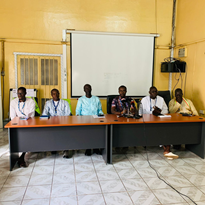By Sariba Manneh
The Managing Director of the Gambia Ports Authority (GPA), Mr.OusmanJobarteh, has informed the media that the GPA risks losing business in 2024, if no investment is made, citing challenges such as a congested port area.
Mr. Jobarteh made the aforesaid statement during a press briefing with journalists on the progress made by Ports Authority and their plans for 2024, with particular focus on improving the quality of service delivery.
“We have observed a growth of 7% provided with a comprehensive overview of various developmental activities, challenges and success stories from January to November 2023. 18% was handled in terms of volume of cargo at the port, excluding the Coronavirus period. New players also entered the market and our transit business grew by 102% within three years. This necessitates addressing capacity constraints, leading to the commissioning of a new master plan by an international consulting firm. The forecasts from 2019 to 2023 indicate that port business has outgrown the facility, posing a threat of losing business without necessary investments,” Mr Jobarteh explained.
He emphasized the improvements achieved through a performance contract that sets target areas for the institution including financial and service delivery aspects. He revealed GPA’s implementation of digitization mechanisms to enhance the system, reduce human interference and promote accountability and efficiency.
Acknowledging challenges in handling increased sea traffic, Jobarteh highlighted the development of a master plan to expand areas such as the existing jetty, container terminal, and digitization. He said the plan also includes the relocation of the port to Sanyang to accommodate a larger volume of ships, and addressing the current limitation of handling only two ships simultaneously. Efforts to combat delay and congestion at the port were discussed, with Jobarteh mentioning stakeholder engagements and collaborative measures with institutions like GRA. He reported significant improvements in terms of reducing ship waiting times from fourteen days to less than five days, between September and December.
Jobarteh noted that approximately 80% of goods entering the Gambia are transported to third countries through transit or cross-border export trade. Additionally, he addressed the impact of congestion at the port in Banjul, leading to a diversion of cargo intended for the Gambia to other countries in 2021 and 2022, resulting in low growth in sea traffic.
The press briefing also covered various other issues addressed by port officials.





















